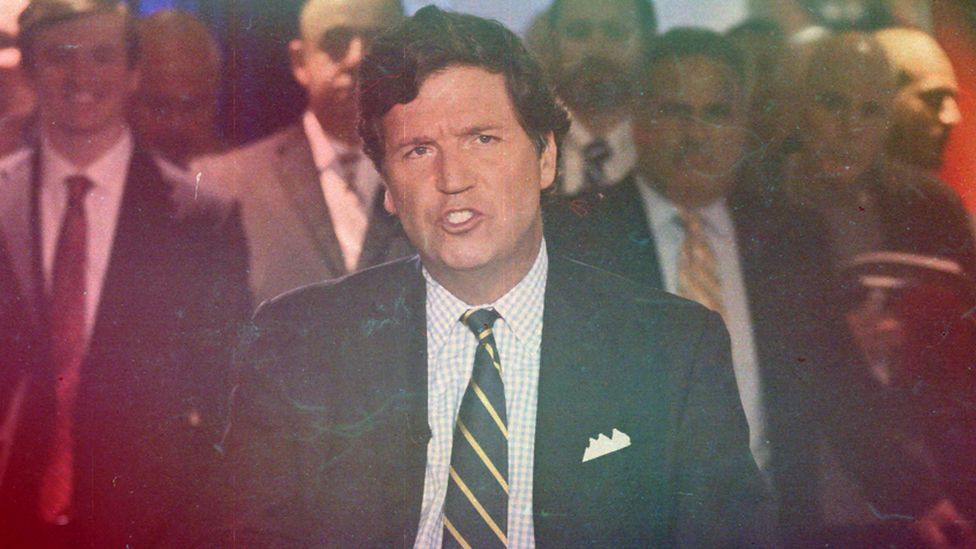ARTICLE AD BOX
 Image source, Getty Images/BBC
Image source, Getty Images/BBC
By Kayla Epstein & Madeline Halpert
BBC News, New York
Last Wednesday night, Tucker Carlson opened his Fox News show in typical fashion. "Sometimes you wonder how filthy and dishonest our news media are," he mused.
"The question is, who is telling the truth? There are not many of those."
For the last six years, Carlson has used his perch to convince a conservative-leaning swathe of the American public that he is one of those few voices of truth - even as he aired segments that critics say featured misinformation and racism.
The approach was incredibly effective. Carlson was one of the highest-rated hosts in network news, consistently attracting about three million viewers, establishing himself as a powerful figure in the conservative movement.
But despite that success, just days after he questioned the honesty of the news media, he would be forced out of primetime.
On Monday, Fox News abruptly announced the network and its biggest star had, in its words, agreed to "part ways".
Neither party has yet provided details of the departure. But Carlson's exit comes days after Fox News paid an extraordinary $787m (£633m) settlement to Dominion Voting Systems over false election claims.
The lawsuit revealed, among other things, that Carlson derided Donald Trump's election fraud claims in private messages while backing them publicly on the air. At one point, he texted that he hated the former president "passionately".
Now, the future of one of America's loudest conservative voices remains uncertain.
A steady rise and a sudden fall
Carlson got his start in the media world of the 1990s, writing for several prominent publications. He worked as a commentator for CNN in the early 2000s before joining MSNBC to host a nightly programme.
He moved over to Fox News in 2009 to work as a political analyst, eventually launching his own show, Tucker Carlson Tonight, in 2016. The debut episode attracted about 3.7 million viewers.
Around that same time, two seismic events swept through the conservative world that propelled Carlson to the media stratosphere.
The first came in 2017, when Fox News fired its biggest star at the time, Bill O'Reilly, leaving an opening for the next network star. The New York Times had reported millions in payouts made to women who had accused O'Reilly of sexual misconduct - allegations he said had no merit.
Carlson's stature ballooned during the Trump era, as he often used his new primetime slot to defend the president, riding a wave of populist outrage that fuelled his election victory.
Image source, Getty Images
Image caption,Ex-president Donald Trump, Tucker Carlson and Republican lawmaker Marjorie Taylor Greene last summer
"The main message is a populist one," Yotam Ophir, who studies disinformation at the State University of New York at Buffalo, explained. "'They', whoever they are, are coming to get you... that the country you love is changing before our eyes. And only we at Fox are willing to say the truth and fight for people's values."
Since launching Tucker Carlson Tonight, "they" have included immigrants, political correctness, the Black Lives Matter movement, Democrats, Hollywood, an amorphous elite class, and LGBT people, to name just a few.
The populist message was potent. Republican politicians were eager to appear on his show, seeing it as a direct conduit to their political base.
His show generated $77.5m in advertising revenue last year, figures from agency Vivvix showed, with Carlson's hour attracting 45% more advertising dollars than the next biggest show in primetime.
After news of his departure broke, Republican lawmakers and right-wing pundits praised Carlson.
Donald Trump Jr., the former president's son, said Carlson was "one of the few voices in the Republican Party that would call out the nonsense from GOP senators, governors, and otherwise".
Accusations of racism and misogyny
While lauded on the right, Mr Carlson and his show frequently drew condemnation from misinformation experts, fact-checkers and activists.
He was accused of elevating racist and nativist talking points and promoting conspiracy theories.
Experts on hate speech and extremism have accused him of endorsing white supremacist ideologies.
In 2020, Carlson called it "soulless" and "craven" to support the Black Lives Matter movement. He claimed it was "definitely not about black lives".
Carlson faced condemnation outside of his show, as well.
In recordings from 2006-11 obtained by a watchdog that monitors conservative media, Carlson called women "extremely primitive", defended child marriage and made sexual comments about underage girls. Carlson responded by inviting "anyone who disagrees" with his comments to appear on his show.
In another instance, audio captured him calling Iraq a "crappy place filled with... semiliterate primitive monkeys".
In 2019, Carlson criticised Ilhan Omar, the Somali-born Muslim Democratic congresswoman, saying on his show she was "living proof that the way we practice immigration has become dangerous to this country".
Carlson also faced accusations of spreading misinformation around Covid-19 vaccine requirements, and entertaining election-denying conspiracy theories - even though, as the Dominion lawsuit revealed, he privately denounced Trump's claims to have won the 2020 election.
"Not everything he says is misinformative, but it all creates this aura of disregard for truth," said Kristy Roschke, a media literacy expert at Arizona State University.
"Those things have had a tremendous impact on our media environment and therefore on the viewer."
An unexpected exit
His controversial statements did not go unnoticed - and occasionally caused blowback for the network - such as in 2018 when he said immigrants made America "poorer and dirtier", leading several large companies to pull their advertisements. But for the most part, the network left him to his own devices.
Which makes his sudden, unexplained departure from Fox News all the more shocking.
Image source, Getty Images
Image caption,Carlson - seen here on a billboard at Fox News HQ - was at the heart of its primetime schedule
BBC News contacted a lawyer said to be representing Carlson, but did not receive a reply. Carlson himself has remained silent thus far.
High profile conservatives expressed their support. Commentator Matt Walsh said the move was "disastrous" for Fox News, and called Carlson "by far the most important and relevant figure at the network".
Carlson's next move remains unclear.
Like his predecessors O'Reilly and the bombastic former opinion host Glenn Beck, who was prominent during the Obama era, he may try to pivot into his own media brand.
Both Beck and O'Reilly - who have launched news podcasts alongside other ventures - have struggled to command the same level of influence.
Nonetheless, Carlson's supporters are optimistic. "Wherever Tucker Carlson goes," Republican congresswoman Lauren Boebert tweeted, "America will follow!"
Without the powerful engine of Fox News behind him, it is unclear whether Carlson will continue to hold sway.
"It is a watershed moment," said Mr Ophir. "His departure from Fox is a big moment for the balance of our information system at large."

 2 years ago
47
2 years ago
47








 English (US) ·
English (US) ·